xkcd: Meltdown and Spectre
 Quelle: xkcd: Meltdown and Spectre
Quelle: xkcd: Meltdown and Spectre
Der Schwarm
Text: Christoph Koch
Fotografie: Charlotte Schreiber
Kleine Geschäfte, Imbisse und Freiberufler sind die Nachzügler bei der Digitalisierung. Einer der profiliertesten deutschen IT-Unternehmer will das ändern.

1984 lässt grüßen:
In China wird das Social Credit System getestet. Es überwacht, bewertet und erzieht die Bürger. Wie bei einer Rating-Agentur. Können die Bürger diesen Stand einige Zeit lang halten, sollen sie zur Belohnung vergünstigte Kredite erhalten oder eine bessere Krankenversicherung. Auch bei der Vergabe von Studienplätzen an die eigenen Kinder könnte sich eine hohe Punktzahl positiv auswirken. Wer hingegen unter einen Wert von 600 fällt, landet in der schlechtesten Kategorie D. Betroffene müssen sogar befürchten, ihre Jobs zu verlieren.
Quelle: China: Die AAA-Bürger – Golem.de

I’ve always liked sorting algorithms, so I wrote up a program to visualize them, starting with Bubble Sort. Each row of the image represents an independent list being sorted.
Source: https://imgur.com/gallery/voutF
We discovered serious weaknesses in WPA2, a protocol that secures all modern protected Wi-Fi networks. Attackers can use this novel attack technique to read information that was previously assumed to be safely encrypted. The attack works against all modern protected Wi-Fi networks.
Quelle: KRACK Attacks: Breaking WPA2
For progressive and even centrist Germans, the startup-style definition of Erfolg (or “success”) is utterly incompatible with their values—which do not center on individual wealth, recognition, or even careers.
To most of Germany, the hagiography of bootstrap capitalism is not just morally wrong; it’s incomprehensible.
Many Germans would rather go into public service than start a business themselves.
Quelle: Germany is successful and happy because its values are the opposite of Silicon Valley’s — Quartz

“Happiness is not the absence of problems, it’s the ability to deal with them.”
Steve Maraboli